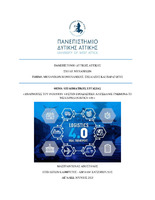| dc.contributor.advisor | Chatzopoulos, Avraam | |
| dc.contributor.author | Μαστραντωνάς, Απόστολος | |
| dc.date.accessioned | 2023-07-23T19:08:00Z | |
| dc.date.available | 2023-07-23T19:08:00Z | |
| dc.date.issued | 2023-07 | |
| dc.identifier.uri | https://polynoe.lib.uniwa.gr/xmlui/handle/11400/4791 | |
| dc.identifier.uri | http://dx.doi.org/10.26265/polynoe-4629 | |
| dc.description.abstract | Στη σημερινή εποχή, η τεχνολογία εξελίσσεται με πολύ γρήγορους ρυθμούς. Σε αυτό έχει συμβάλλει η 4η Βιομηχανική Επανάσταση ή Industry 4.0 . Το Industry 4.0 θέτει ως στόχο τη χρήση μεγάλων δικτύων μηχανών που θα διαμορφώνουν τις έξυπνες γραμμές παραγωγής με ικανότητα αυτόνομης ανταλλαγής πληροφοριών και ελέγχου. Η παρούσα διπλωματική εργασία έχει ως απώτερο σκοπό την εισαγωγή των θεμελιωδών αρχών του Industry 4.0 και την επίδραση που θα επιφέρει στην εφοδιαστική αλυσίδα στο σύνολό της. Το Industry 4.0 μέσω της εφοδιαστικής αλυσίδας ή Logistics 4.0 αποτελεί ευκαιρία για την εισαγωγή νέων τεχνολογιών που θα συνοδεύουν τη ψηφιοποίηση και την αυτοματοποίηση των διαδικασιών παραγωγής, στοχεύοντας την αναδιάρθρωση της γραμμής παραγωγής και της αλυσίδας εφοδιασμού. Ακόμη, διαφαίνεται και η σημαντικότητα του ανθρώπινου δυναμικού στο νέο παραγωγικό περιβάλλον.Η εφοδιαστική αλυσίδα κρίνεται πολύ σημαντική στο παρόν αλλά και στο μέλλον, γιατί χωρίς αυτήν τα προϊόντα που παράγονται από τις βιομηχανίες δε θα μπορούν να φτάνουν στον καταναλωτή έγκαιρα και με τη ποιότητά τους αμετάβλητη. Για αυτό το λόγο, κρίνεται επιτακτική η ανάγκη ενσωμάτωσης και αξιοποίησης των νέων τεχνολογιών του Industry 4.0, αφού στοχεύουν στην επιτυχή εφαρμογή της τεχνολογίας με εξαιρετικά ευέλικτη μαζική παραγωγή, μείωση του κόστους πολυπλοκότητας, εμφάνιση νέων υπηρεσιών και επιχειρηματικών μοντέλων, συντονισμό και έξυπνη αυτοδιαχείριση σε πραγματικό χρόνο και βελτιστοποίηση των αλυσίδων αξίας για τη διατήρηση του ανταγωνιστικού πλεονεκτήματός τους. | el |
| dc.format.extent | 104 | el |
| dc.language.iso | el | el |
| dc.publisher | Πανεπιστήμιο Δυτικής Αττικής | el |
| dc.rights | Αναφορά Δημιουργού - Μη Εμπορική Χρήση - Παρόμοια Διανομή 4.0 Διεθνές | * |
| dc.rights | Attribution-NonCommercial-NoDerivatives 4.0 Διεθνές | * |
| dc.rights.uri | http://creativecommons.org/licenses/by-nc-nd/4.0/ | * |
| dc.subject | Έξυπνες γραμμές παραγωγής | el |
| dc.subject | Industry 4.0 | el |
| dc.subject | Logistics 4.0 | el |
| dc.subject | Εφοδιαστική αλυσίδα | el |
| dc.title | Εφαρμογές του Industry 4.0 στην εφοδιαστική αλυσίδα με γνώμονα το μέλλον (Logistics 4.0) | el |
| dc.title.alternative | Industry 4.0 applications in the future-oriented supply chain (Logistics 4.0) | el |
| dc.type | Διπλωματική εργασία | el |
| dc.contributor.committee | Σκλαβούνου, Ελένη-Ορσαλία | |
| dc.contributor.committee | Drosos, Christos | |
| dc.contributor.faculty | Σχολή Μηχανικών | el |
| dc.contributor.department | Τμήμα Μηχανικών Βιομηχανικής Σχεδίασης και Παραγωγής | el |
| dc.description.abstracttranslated | Νowadays, technology is evolving at a very fast pace. The 4th Industrial Revolution or Industry 4.0 has contributed to this. Industry 4.0 aims to use large networks of machines that will shape intelligent production lines capable of autonomous information exchange and control. This thesis aims to introduce the fundamental principles of Industry 4.0 and the effect it will have on the supply chain as a whole. Industry 4.0 through the supply chain or Logistics 4.0 is an opportunity to introduce new technologies that will accompany the digitization and automation of production processes, targeting the restructuring of the production line and the supply chain. Furthermore, the importance of human resources in the new production environment is also evident. The supply chain is considered very important in the present but also in the future, because without it the products produced by the industries will not be able to reach the consumer on time and with their quality unchanged. For this reason, the need to integrate and exploit the new technologies of Industry 4.0 is deemed imperative, since they aim at the successful application of technology with
highly flexible mass production, reduction of complexity costs, emergence of new services and business models, coordination and intelligent self-management in real time and optimizing value chains to maintain their competitive advantage. | el |


